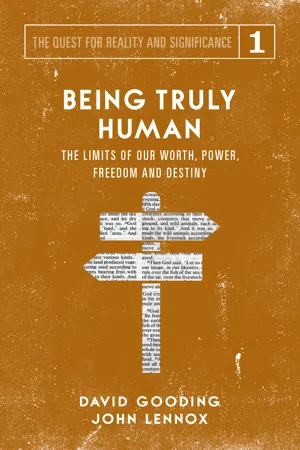
eBook - ePub
Being Truly Human
The Limits of Our Worth, Power, Freedom and Destiny
This is a test
- English
- ePUB (mobile friendly)
- Available on iOS & Android
eBook - ePub
Being Truly Human
The Limits of Our Worth, Power, Freedom and Destiny
Book details
Book preview
Table of contents
Citations
About This Book
In Book 1 – Being Truly Human, Gooding and Lennox address issues surrounding the value of humans. They consider the nature and basis of morality, compare what morality means in different systems, and assess the dangerous way freedom is often devalued. What should guide our use of power? What should limit our choices? And to what extent can our choices keep us from fulfilling our potential?
Frequently asked questions
At the moment all of our mobile-responsive ePub books are available to download via the app. Most of our PDFs are also available to download and we're working on making the final remaining ones downloadable now. Learn more here.
Both plans give you full access to the library and all of Perlego’s features. The only differences are the price and subscription period: With the annual plan you’ll save around 30% compared to 12 months on the monthly plan.
We are an online textbook subscription service, where you can get access to an entire online library for less than the price of a single book per month. With over 1 million books across 1000+ topics, we’ve got you covered! Learn more here.
Look out for the read-aloud symbol on your next book to see if you can listen to it. The read-aloud tool reads text aloud for you, highlighting the text as it is being read. You can pause it, speed it up and slow it down. Learn more here.
Yes, you can access Being Truly Human by David W. Gooding, John C. Lennox in PDF and/or ePUB format, as well as other popular books in Philosophy & Ethics & Moral Philosophy. We have over one million books available in our catalogue for you to explore.
Information
Topic
PhilosophySubtopic
Ethics & Moral PhilosophyChapter 1The Basic Value of a Human Being
If we say that human life is valuable, surely we must mean more than that parents who welcome and love a newborn baby should not destroy it, but parents for whom a newborn child is neither wanted nor loved should be free to destroy it. That would reduce the value of life to a mere matter of arbitrary, personal taste.

The value of life
Without first attempting to define human life—for that could be a long, if not impossible, task—let’s begin by asking: what value do we put on human life? After all, we are all human beings, we are all alive, and what is more, we all have direct personal experience of being alive. We ought, therefore, to be able to decide what value we place on human life; our own of course to start with, yet not merely our own, but other people’s as well.
And let’s be clear what exactly we mean by ‘placing value on human life’. We are not asking: how much have we enjoyed living in the past? Or: are we having any rewarding experiences of life in the present? We are asking: what value do we put on human life in and of itself? Is human life, our own or any other person’s, so valuable that it would be wrong to mistreat it or to diminish it in any way or to destroy it? The answer to this question is fundamental to our attitude to other people, and likewise to ourselves.
So let’s start with a real-life, practical situation that will bring us at once to the heart of the matter.
The question of infanticide
All of us were newborn babies once, and presumably we are grateful that no one practised infanticide on us. But is there anything wrong with infanticide? And if so, what and why?
In ancient Greece the father (or both parents) of an unwanted child was allowed to take the baby, place it in an open box or jar, and set it on the mountainside to be devoured by wild beasts (they thus tried to salve their conscience by pretending that it was not they who killed the child, but wild beasts). The historians Professor M. Cary and Professor T. J. Haarhoff comment that after 200 bc this way of disposing of unwanted children ‘seems to have become frequent enough to keep the Greek population at a stationary level, and even to induce a sharp regression in some cities’.1 Intentionally or not, infanticide seems not only to have been a means by which a family limited the demands on its budget, but to have become also a way of population control.
Table of contents
- Illustrations
- Series Preface
- Analytical Outline
- Series Introduction
- 1. The Basic Value of a Human Being
- 2. Human Freedom and the Danger of its Devaluation
- 3. The Nature and Basis of Morality
- 4. Comparative Moralities
- 5. The Role and Power of Humans over Nature
- 6. The Parameters of Human Power
- 7. Human Destiny
- Appendix: The Scientific Endeavour
- Series Bibliography
- Study Questions for Teachers and Students
- Scripture Index
- General Index
- About the Authors
